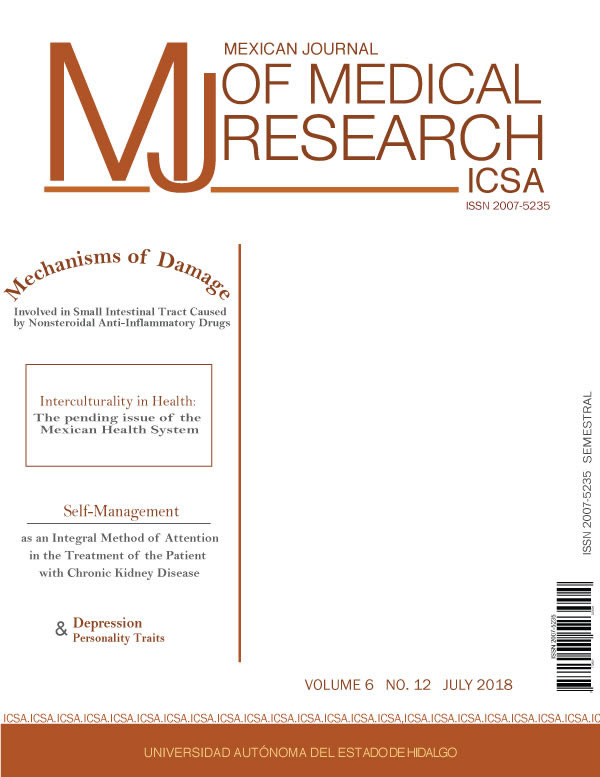Depression and Personality Traits
DOI:
https://doi.org/10.29057/mjmr.v6i12.3165Keywords:
Depression, Personality traits, factors, Cloninger TheoryAbstract
Temperament is a risk factor for major depressive disorder, more specifically neuroticism or negative emotionality and it seems that higher levels makes the subjects more likely to develop depressive episodes in response to stressful life events. The objective of this review is to establish those personality traits that are most related to depression. From all the articles, seven of them are about the high levels of neuroticism and low levels of extroversion in depressive patients, this for the theory of the five factors. On the other hand, the studies based on the Cloninger theory talk about high levels of damage avoidance and low levels of self-directivity that are related to the presentation of the disorder. Regardless of the theory used, it becomes evident the need to interrogate personality traits in psychiatric and healthy patients, in the latter for the prevention of disorders.
Downloads
Publication Facts
Reviewer profiles N/A
Author statements
- Academic society
- N/A
- Publisher
- Universidad Autónoma del Estado de Hidalgo
References
Asociación Americana de Psiquiatría. Manual Diagnóstico y Estadístico de los Trastornos Mentales (DSM - V) [e-book]. Virginia: Panamericana; 2014.
Heinze G, Vargas B, José C. Síntomas psiquiátricos y rasgos de personalidad en dos grupos opuestos de la Facultad de Medicina de la UNAM. Salud Ment. 2008;31(5):343-350.
Malouff JM, Thorsteinsson EB, Schutte NS. The relationship between the five-factor model of personality and symptoms of clinical disorders: a meta-analysis. J Psychopathol. Behav. Asess. 2005;27:101–114.
García-Méndez GA. Estructura factorial del modelo de personalidad de Cattell en una muestra Colombiana y su relación con el modelo de 5 factores. Avances en Medición. 2005;3:53-72.
Jylhä P, Melartin T, Rytsalä H, Isometsä E. Neuroticism, introversion, and mayor depressive disorder - traits, states or scars?. Depress Anxiety. 2009;26:325-334.
Wiktorsson S, Berg A, Billstedt E, Duberstein P, Marlow T, Skoog I, et al. Neuroticism and extroversion in suicide attempters aged 75 and above and a general population comparison group. Aging Ment. Health 2013;17(4):479-488.
Klein D, Kotov R, Bufferd S. Personality and Depression: Explanatory Models and Review of the Evidence. Annu. Rev. Clin. Psychol 2011;7:269-295.
Hakulinen C, Elovainio M, Pulkki L, Virtanen M, Kivimäki M, Jokela M. Personality and depressive symptoms: individual participant meta-analysis of 10 cohort studies. Depress Anxiety. 2015;32(7):461-470.
Weber K, Giannakopoulos P, Canuto A. Exploring the impact of personality dimensions in late-life depression. Curr. Opin. Psychiatry 2011;24(6):478-483.
Robison E, Shankman S, McFarland B. Independent Associations Between Personality Traits and Clinical Characteristics of Depression. J. Nerv. Ment. Dis. 2009;197(7):476-483.
Quilty L, De Fruyt F, Rolland J, Kennedy S, Rouillon P, Bagby R. Dimensional personality traits and treatment outcome in patients with major depressive disorder. J. Affect Disord. 2008;108(3):241-250.
Spittlehouse J, Pearson J, Luty S, Mulder R, Carter J, McKenzie J et al. Measures of temperament and character are differentially impacted on by depression severity. J. Affect Disord. 2010;126(2):140-146.
Mochcovitch M, Nardi A, Cardoso A. Temperament and Character Dimensions and their Relationship to Major Depression and Panic Disorder. Rev. Bras. Psiquiatr. 2012;34(3):342-351.
Mitsui N, Asakura S, Shimizu Y, Fujii Y, Kako Y, Tanaka T, et al. Temperament and character profiles of Japanese university students with depressive episodes and ideas of suicide or self-harm: A PHQ-9 screening study. Compr, Psychiatry 2013;54(8):1215-1221.
Zappitelli M, Bordin I, Hatch J, Caetano S, Zunta G, Olvera R, et al. Temperament and character traits in children and adolescents with major depressive disorder: A case–control study. Compr. Psychiatry 2013;54(4):346-353.
Seo H, Jung Y, Jeong S, Kim J, Lee M, Kim J, et al. Personality traits associated with suicidal behaviors in patients with depression: The CRESCEND study. Compr. Psychiatry. 2014;55(5):1085-1092.
Kronström K, Salminen J, Hietala J, Kajander J, Vahlberg T, Markkula J, et al. Personality traits and recovery from major depressive disorder. Nord. J. Psychiatry 2010;65(1):52-57.
Minaya O, Fresán A, Loyzaga C. Dimensiones de temperamento y carácter en pacientes con primer episodio de depresión mayor. Salud Ment. 2009;32:309-315.
Cloninger, R. Temperament and personality. Curr. Opin. Neurobiol. 1994;4:266-273.
Yang S, Sung J, Kim J, Song Y, Lee K, Kim H, et al. Some personality traits converge gradually by long-term partnership through the lifecourse - Genetic and environmental structure of Cloninger's temperament and character dimensions. J. Psychiatr. Res. 2015;63:43-49.
Dinger U, Barrett M, Zimmermann J, Schauenburg H, Wright A, Renner F, et al. Interpersonal Problems, Dependency, and Self-Criticism in Major Depressive Disorder. J. Clin. Psychol. 2014;71(1):93-104.
Bulmash E, Harkness K, Stewart J, Bagby R. Personality, stressful life events, and treatment response in major depression. J. Consult. Clin. Psychol. 2009;77(6):1067-1077.
Domes G, Spenthof I, Radtke M, Isaksson A, Normann C, Heinrichs M. Autistic traits and empathy in chronic vs. episodic depression. J. Affect Disord. 2016;195:144-147.






















